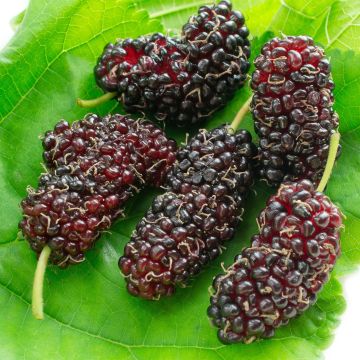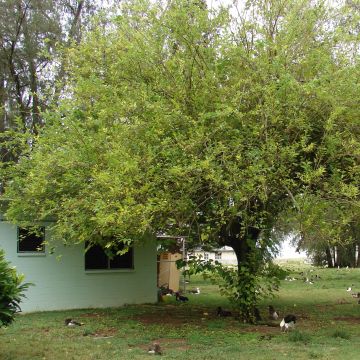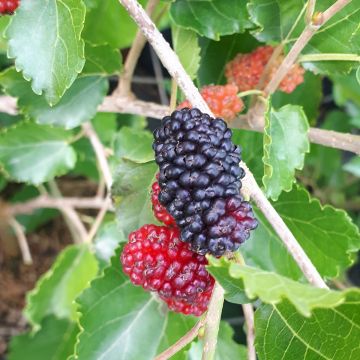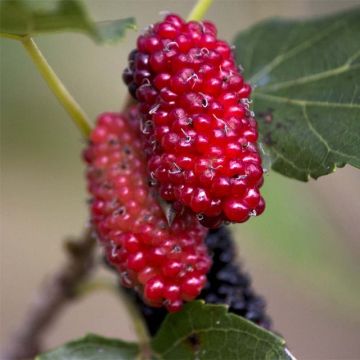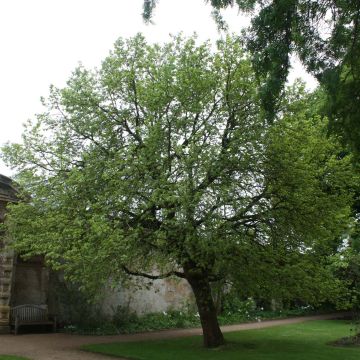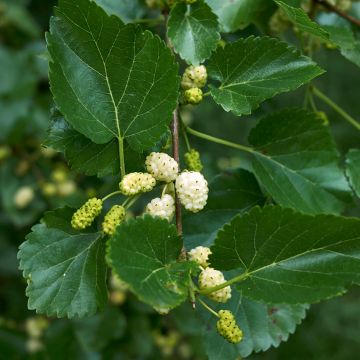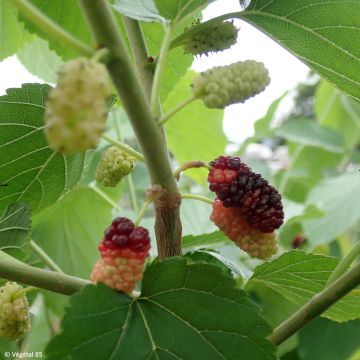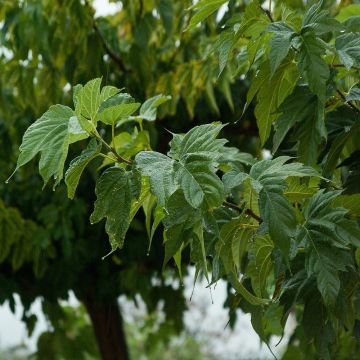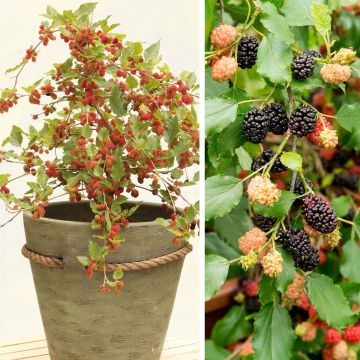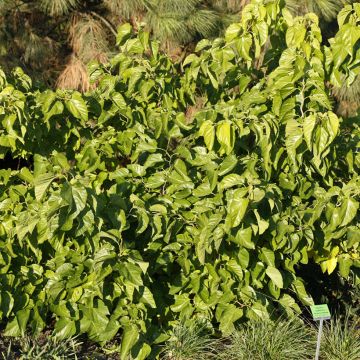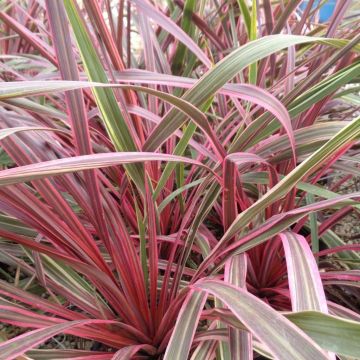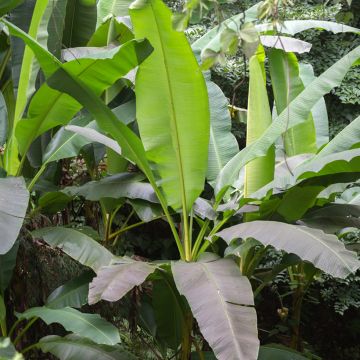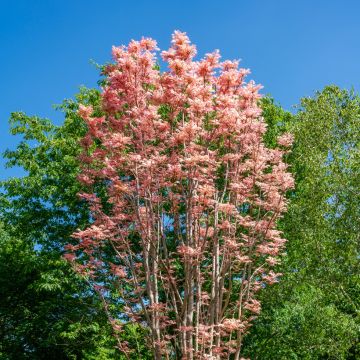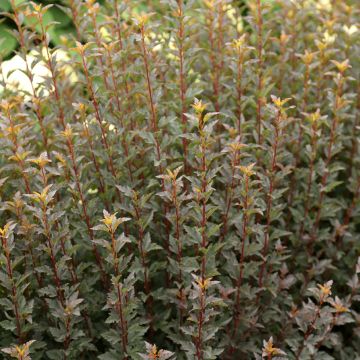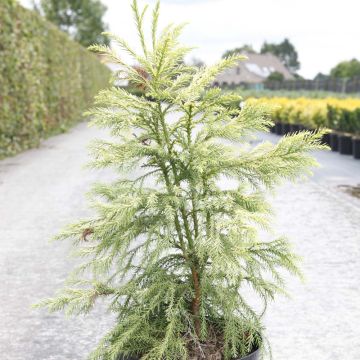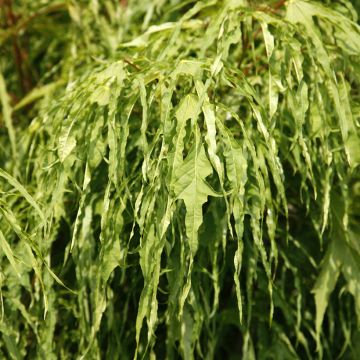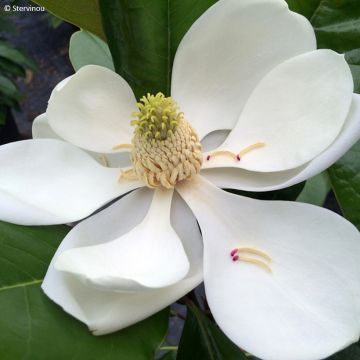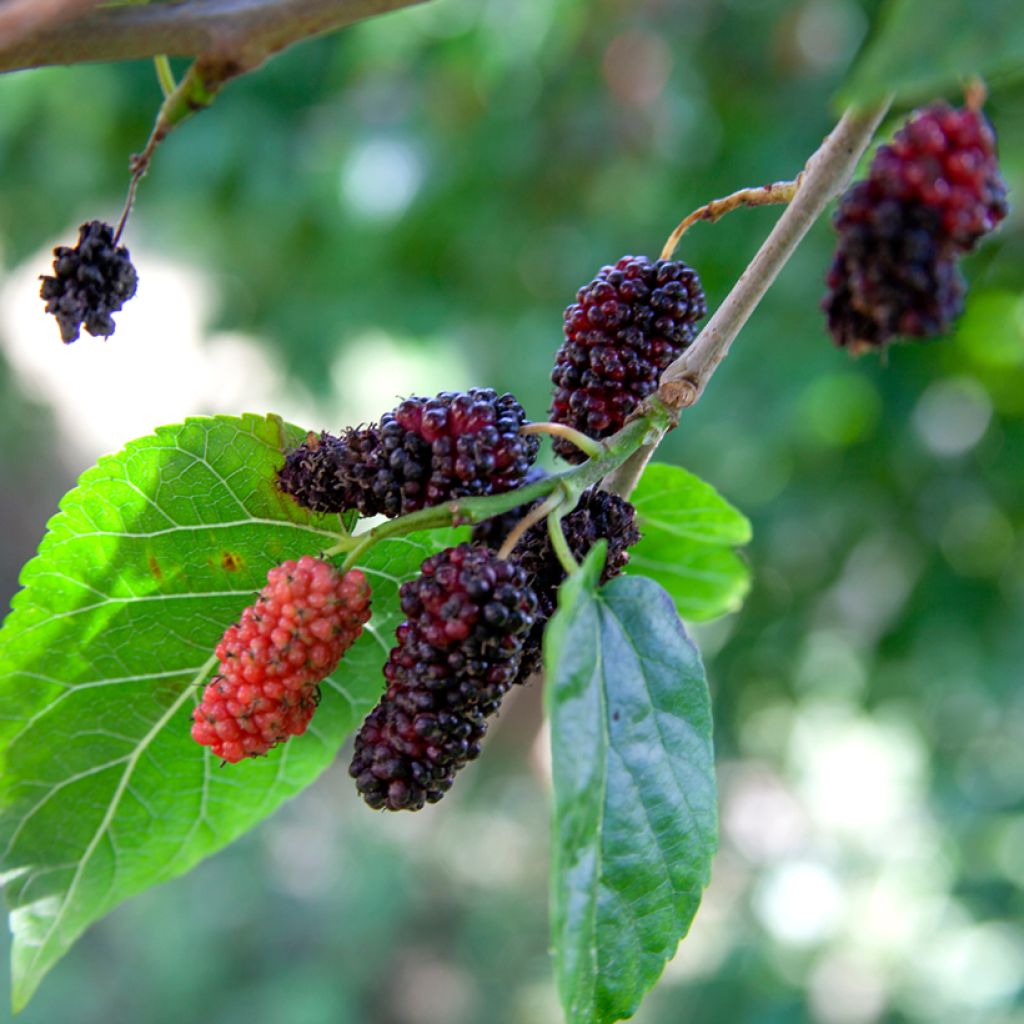

Morus Shin Tso
Morus Shin Tso
Morus alba x bombycis Shin Tso
White Mulberry, Silkworm Mulberry
This item cannot be shipped to the selected country
Delivery charge from €5.90
More information
Schedule delivery date,
and select date in basket
This plant carries a 24 months recovery warranty
More information
We guarantee the quality of our plants for a full growing cycle, and will replace at our expense any plant that fails to recover under normal climatic and planting conditions.
From €5.90 for pickup delivery and €6.90 for home delivery
Express home delivery from €8.90.
Does this plant fit my garden?
Set up your Plantfit profile →
Description
Morus alba 'Shin Tso' is a hybrid of the White Mulberry tree, whose fruits are black when ripe and considered by enthusiasts to be more flavourful than those of the white mulberry. This variety produces large, elongated, sweet, juicy, and fragrant mulberries, which reveal an original sweet and sour flavour. It also makes an excellent shade tree due to its wide crown and dense, lush deciduous foliage. The fruits of the Japanese mulberry 'Shin Tso' are harvested between July and September. It is very hardy and resistant to heat and drought once well-rooted.
The 'Shin Tso' mulberry belongs to the Moraceae family. According to nomenclatures, it is called Morus x 'Shin Tso', Morus alba x bombycis 'Shin Tso', or Morus bombycis ‘Shin-Tso’. It is commonly called the Japanese mulberry. The white mulberry is native to the Indian Himalayas and Pakistan, but cultivated elsewhere. Morus bombycis (Morus australis), the plane-leaved mulberry or plane tree mulberry, is native to Asia and was introduced to Europe in the early 20th century. Like all trees in the Moraceae family, it produces latex in its tissues.
The 'Shin Tso' mulberry is a tree with a short, thick trunk, topped by a spreading crown that can be somewhat irregular if not pruned. Its growth is rapid during the first few years, then slows down. It can reach 5 to 9m in all directions. Its light grey bark cracks and thickens, then turns grey-brown. The deciduous leaves can have a different appearance depending on the age of the tree and their position on the branches. They measure 6 to 8cm in diameter, 10 to 20cm in length, and are alternate, petiolate, usually divided into 3 to 7 lobes, with irregularly toothed margins. The shiny upper surface is light green, turning golden yellow in autumn.
The 'Shin Tso' mulberry quickly bears fruit, it can produce after 5 years of cultivation, depending on the conditions. This self-fertile variety develops male or female flowers in different locations on the same plant in March-April. Its discreet flowering consists of male or female catkins composed of tiny green-yellow flowers. In June-July, the female flowers produce fleshy fruits up to 8cm long. Their colour changes from green to red, then almost black when ripe. They are edible, but loved by birds. The taproot and running root system of this tree does not tolerate transplanting well. Its strength means that it should be planted at a respectable distance from buildings. Its lifespan can reach or even exceed 150 years.
Morus alba 'Shin Tso' grows in fertile, well-worked, and well-drained soil, in a sunny location. It tolerates cold and summer drought well. Uncultivated land benefits from its presence, as its leaves gradually enrich the soil each autumn. Traditionally used as a street tree, it can also be planted in a fruit hedge, especially with blackthorns, Elaeagnus umbellata, and other ornamental apple trees loved by birds. It can also be a beautiful specimen, planted alone in the middle of a lawn. The chicken coop will benefit from its beneficial shade, and the chickens will enjoy its fruits. Avoid planting it near the terrace, as its fruits stain the ground. Its leaves can be used as food for silkworms and it tolerates pruning very well.
The fruits of the 'Shin Tso' white mulberry are consumed fresh or cooked. They have a pleasant taste and are rich in vitamin C and D. They are also used to make jams and jellies or to garnish pies. They add a touch of sweetness to summer salads and fruit salads. Their flavour pairs well with blackberries (wild blackberry or garden blackberry) and stone fruits such as apricots, plums, and peaches. Those who enjoy sweet and savoury flavours can use them to accompany pork, duck, or game. They also pair well with basil, mint, spices used in pastry, rocket, cream, mascarpone, and citrus fruits.
Report an error about the product description
Plant habit
Flowering
Foliage
Botanical data
Morus
alba x bombycis
Shin Tso
Moraceae
White Mulberry, Silkworm Mulberry
Murier à gros fruit Shin Tso, Morus bombycis Shin-Tso, Morus x ‘Shin-Tso’
Cultivar or hybrid
Other Morus - Mulberry
Planting and care
Morus alba 'Shin Tso' should be planted in spring or autumn in well-drained, fertile and deep soil, even limestone, in full sun. Be careful not to damage its fleshy and brittle roots during planting. It tolerates cold well and once well-rooted and can withstand hot and dry summers. Prune to maintain a beautiful shape. It may be subject to rust, hemp or powdery mildew, in which case treat with copper.
Planting period
Intended location
Care
This item has not been reviewed yet - be the first to leave a review about it.
Striking foliage shrubs
Haven't found what you were looking for?
Hardiness is the lowest winter temperature a plant can endure without suffering serious damage or even dying. However, hardiness is affected by location (a sheltered area, such as a patio), protection (winter cover) and soil type (hardiness is improved by well-drained soil).

Photo Sharing Terms & Conditions
In order to encourage gardeners to interact and share their experiences, Promesse de fleurs offers various media enabling content to be uploaded onto its Site - in particular via the ‘Photo sharing’ module.
The User agrees to refrain from:
- Posting any content that is illegal, prejudicial, insulting, racist, inciteful to hatred, revisionist, contrary to public decency, that infringes on privacy or on the privacy rights of third parties, in particular the publicity rights of persons and goods, intellectual property rights, or the right to privacy.
- Submitting content on behalf of a third party;
- Impersonate the identity of a third party and/or publish any personal information about a third party;
In general, the User undertakes to refrain from any unethical behaviour.
All Content (in particular text, comments, files, images, photos, videos, creative works, etc.), which may be subject to property or intellectual property rights, image or other private rights, shall remain the property of the User, subject to the limited rights granted by the terms of the licence granted by Promesse de fleurs as stated below. Users are at liberty to publish or not to publish such Content on the Site, notably via the ‘Photo Sharing’ facility, and accept that this Content shall be made public and freely accessible, notably on the Internet.
Users further acknowledge, undertake to have ,and guarantee that they hold all necessary rights and permissions to publish such material on the Site, in particular with regard to the legislation in force pertaining to any privacy, property, intellectual property, image, or contractual rights, or rights of any other nature. By publishing such Content on the Site, Users acknowledge accepting full liability as publishers of the Content within the meaning of the law, and grant Promesse de fleurs, free of charge, an inclusive, worldwide licence for the said Content for the entire duration of its publication, including all reproduction, representation, up/downloading, displaying, performing, transmission, and storage rights.
Users also grant permission for their name to be linked to the Content and accept that this link may not always be made available.
By engaging in posting material, Users consent to their Content becoming automatically accessible on the Internet, in particular on other sites and/or blogs and/or web pages of the Promesse de fleurs site, including in particular social pages and the Promesse de fleurs catalogue.
Users may secure the removal of entrusted content free of charge by issuing a simple request via our contact form.
The flowering period indicated on our website applies to countries and regions located in USDA zone 8 (France, the United Kingdom, Ireland, the Netherlands, etc.)
It will vary according to where you live:
- In zones 9 to 10 (Italy, Spain, Greece, etc.), flowering will occur about 2 to 4 weeks earlier.
- In zones 6 to 7 (Germany, Poland, Slovenia, and lower mountainous regions), flowering will be delayed by 2 to 3 weeks.
- In zone 5 (Central Europe, Scandinavia), blooming will be delayed by 3 to 5 weeks.
In temperate climates, pruning of spring-flowering shrubs (forsythia, spireas, etc.) should be done just after flowering.
Pruning of summer-flowering shrubs (Indian Lilac, Perovskia, etc.) can be done in winter or spring.
In cold regions as well as with frost-sensitive plants, avoid pruning too early when severe frosts may still occur.
The planting period indicated on our website applies to countries and regions located in USDA zone 8 (France, United Kingdom, Ireland, Netherlands).
It will vary according to where you live:
- In Mediterranean zones (Marseille, Madrid, Milan, etc.), autumn and winter are the best planting periods.
- In continental zones (Strasbourg, Munich, Vienna, etc.), delay planting by 2 to 3 weeks in spring and bring it forward by 2 to 4 weeks in autumn.
- In mountainous regions (the Alps, Pyrenees, Carpathians, etc.), it is best to plant in late spring (May-June) or late summer (August-September).
The harvesting period indicated on our website applies to countries and regions in USDA zone 8 (France, England, Ireland, the Netherlands).
In colder areas (Scandinavia, Poland, Austria...) fruit and vegetable harvests are likely to be delayed by 3-4 weeks.
In warmer areas (Italy, Spain, Greece, etc.), harvesting will probably take place earlier, depending on weather conditions.
The sowing periods indicated on our website apply to countries and regions within USDA Zone 8 (France, UK, Ireland, Netherlands).
In colder areas (Scandinavia, Poland, Austria...), delay any outdoor sowing by 3-4 weeks, or sow under glass.
In warmer climes (Italy, Spain, Greece, etc.), bring outdoor sowing forward by a few weeks.

































